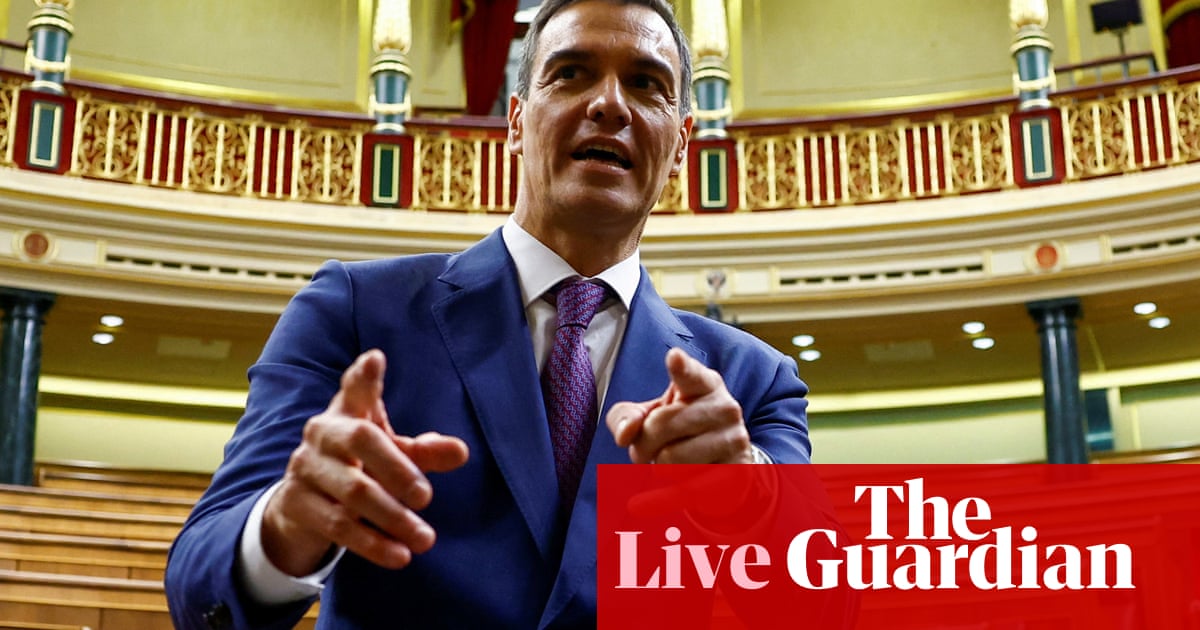
The Spanish Socialist leader, Pedro Sánchez, has ruled out a return to the polls following Sunday’s inconclusive snap general election, insisting a new government can be formed after his ruling coalition was narrowly beaten by the opposition conservative People’s party (PP).
Numerous opinion polls had suggested the PP and its potential allies in the far-right Vox party would comfortably win enough votes to topple the government of Sánchez’s Spanish Socialist Workers’ party (PSOE) and its partners in the far-left Unidas Podemos alliance.
The conservatives finished first with 136 seats in Spain’s 350-seat congress but found themselves up against a resurgent PSOE, which finished second with 122 seats. The Vox party, heavily touted as a kingmaker, suffered a crushing night with its seat count dropping from 52 to 33.
The hung parliament means the left and right blocs are trying to put together coalition governments while Sánchez remains as acting prime minister.
Between them, the PP and Vox won 169 seats – seven short of the threshold needed for an absolute majority in congress – while the PSOE and its allies in the new, far-left Sumar coalition won 153 seats between them. Although the right bloc has more seats, the left bloc has a greater chance of securing the support of smaller regional parties, many of which will be put off a potential PP government because of the party’s recent coalition deals with Vox following May’s regional and municipal elections.
PSOE sources said the acting prime minister had told his party there was no need for another election because he was “sure that our democracy can find a formula for government”.
However, Sánchez – who is routinely accused by his critics of being far too reliant on the votes of Catalan and Basque separatists – looks likely to need the backing of Junts, a hardline Catalan pro-independence party. Junts is the party of the former Catalan president Carles Puigdemont, who fled Spain to avoid arrest after his unilateral attempts to secure Catalan independence failed six years ago – and who is no fan of Sánchez.
Speaking on Monday, the PP’s leader, Alberto Núñez Feijóo, admitted his party hadn’t “lived up to our expectations” but said he had already spoken to Vox and three regional parties – the Navarrese People’s Union, the Canarian Coalition and the Basque Nationalist party – with a few to forming “a stable government”.
Other senior PP members said the party had a clear mandate to rule and a duty to avoid the possibility of a repeat election later this year.
The party’s deputy organisational secretary, Miguel Tellado, told the state broadcaster TVE that “dialogue, dialogue and dialogue is the challenge that lies ahead for us”, adding: “No one wants a political impasse that could lead to another election.”
Cuca Gamarra, the PP’s general secretary, said her party had won the elections in terms of seats and share of the vote and called on the socialists not to try to cut deals with Catalan separatists.
“You can’t try to pull off an investiture vote at any cost and using anyone’s vote because you’ll end up in the hands of Puigdemont, a fugitive from justice, and in the hands of parties that only want to push for independence,” she told Telecinco on Monday.
Gamarra said there were only two possible options when it came to the next government of Spain: “Either the party that won the elections governs or we end up in a situation with an impasse and another Frankenstein [government].”
Junts has already signalled that its help in returning the socialists to power would have a price. It said it would like to see an amnesty for exiled Catalan politicians and a proper referendum on self-determination. Sánchez, however, has repeatedly said there will be no independence vote.
“We won’t make Pedro Sánchez PM in exchange for nothing,” its leader, Míriam Nogueras, warned on Sunday night. Puigdemont, meanwhile, said his party “owes nothing to anyone but our voters”, adding that it had never supported Sánchez’s budgets, reforms or the “farce” of his dialogue aimed at finding a solution to the question of Catalan independence.
Puigdemont’s suddenly acquired say over who governs Spain will come as a welcome boost to the bitterly divided and stalled regional independence movement. The two main pro-independence parties – Junts and the Catalan Republican Left (ERC) – suffered dismal results on Sunday. The Catalan branch of the socialist party came first, followed by Sumar. The ERC came third, losing six seats, followed by Junts, which lost one seat.
The ERC, which belongs to the more moderate, pragmatic wing of the independence movement, has said it is prepared to support a new, socialist-led government to provide an alternative to a PP-Vox coalition.
Negotiations are likely to be further complicated by a request from prosecutors for a Spanish supreme court judge to issue an arrest warrant for Puidgdemont over this role in the unsuccessful push for independence.
Prosecutors have asked for a European arrest warrant to be issued in light of a decision three weeks ago by the general court of the European Union that dismissed Puigdemont’s appeal to retain immunity from prosecution as a member of the European parliament.
The former regional president’s lawyer, Gonzalo Boye, accused the Spanish judicial authorities of playing politics. “The petition has come in the middle of the debate about the election results,” said Boye. “They are trying to take part in the political debate.”
Puigdemont expressed similar sentiments in a tweet on Monday. “One day you are decisive in order to form a Spanish government, the next day Spain orders your arrest,” he wrote.











